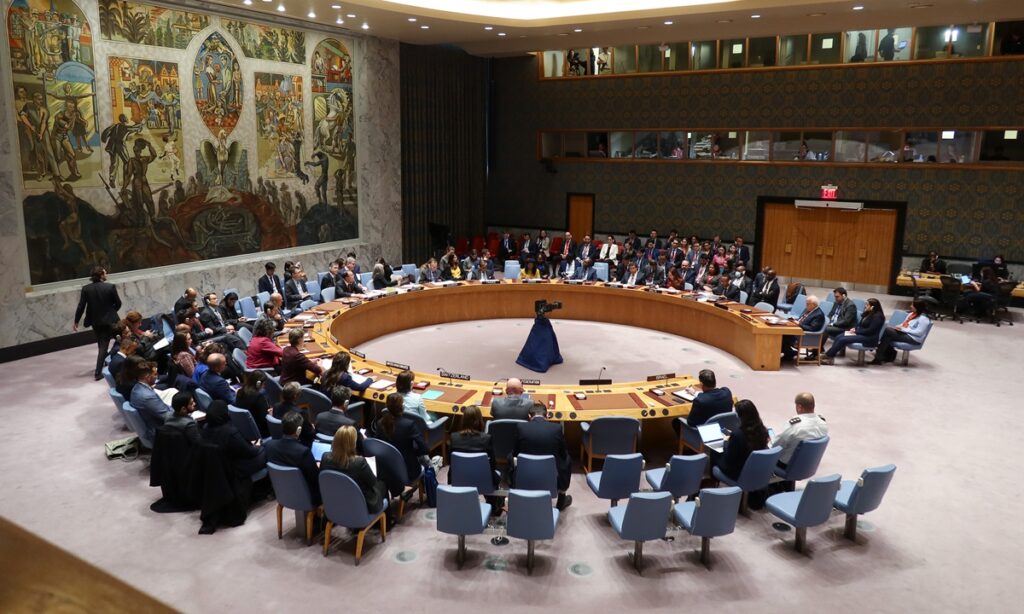The UN Security Council on Wednesday adopted a resolution calling for urgent and extended humanitarian pauses and corridors in Gaza. This is the first product of the Security Council on Gaza after the October 7 escalation. The resolution won the support of 12 of the 15 council members, while Britain, Russia and the US abstained. However, Israel rejected this resolution on Thursday.
The resolution constitutes an initial step toward a cease-fire and sends a clear message that the international community strongly opposes all actions suspected of violating the legitimate rights of women, children, and civilians, and contravening international humanitarian law. It undoubtedly puts pressure on Israel and plays a positive role in furthering humanitarian aid to prevent a larger humanitarian disaster, Liu Zhongmin, a professor at the Middle East Studies Institute of Shanghai International Studies University, told the Global Times.
Despite its positive aspects, it is essential to recognize that this consensus was only reached at a relatively low level. The resolution focuses more on humanitarian relief, an area where consensus among the 15 Security Council members is relatively easier to achieve. The humanitarian pause achieved by this resolution is still far from achieving a crucial cease-fire, as mentioned when Russia abstained from voting.
Unlike a cease-fire, a pause is only a temporary break, with hostilities resuming after humanitarian aid comes in. The US will only support a cease-fire if Israel achieves its strategic goals. Due to domestic elections and the influence of Jewish lobby in the US, the US aligns closely with Israel, prioritizing Israel’s interests and not necessarily considering the lives of the Palestinian people, said Liu Weidong, a research fellow at the Institute of American Studies at the Chinese Academy of Social Sciences.
Another limitation of the resolution is that its effectiveness lies in its implementation. Currently, Israel unilaterally refuses to implement the UN Security Council resolution, calling for the Security Council “to unequivocally condemn Hamas” for its October 7 surprise attack on Israeli communities. This is not surprising based on Israel’s firm stance, which has previously rejected the Biden administration’s push for temporary pauses in Israeli military action in Gaza.
Several previous UN Security Council resolutions have been vetoed by the US, but this time, the US chose to abstain, stating that the resolution did not explicitly condemn Hamas. One of the reasons for this change is the immense international pressure. The US has been a staunch supporter of Israel’s right to self-defense, but Israel’s actions in the war have sparked increasing controversy both within the US and internationally. Calls for the US to stop supporting Israel have emerged from the international community, including Western countries and even Jewish groups within the US. The international and domestic anti-war voices have forced the US to make policy adjustments. The Biden administration attempted to make a gesture in favor of a humanitarian pause by abstaining from voting, signaling to the world that the US does not stand in support of human rights violations.
At the UN level, it is time for the US to make adjustments to its policy. In the current Israel-Palestine issue, the UN is facing a significant tragedy, with over 100 UN personnel losing their lives. Faced with the Security Council’s deadlock, if the US continues on a single track, it will only further damage the authority and credibility of the UN Security Council, which is also detrimental to the international image and leadership of the US.
China, as the rotating president of the Security Council this month, played a proactive role in the passage of this resolution. China adopted a pragmatic approach, aligning with the basic consensus of most countries on preventing humanitarian disasters and strengthening humanitarian relief. Even if a minimal consensus is reached, it may contribute to a shift in the previous state of the UN’s inability to act.
Additionally, the support for this issue by the Security Council is related to China’s consistent stance on the Palestinian issue over the years. China has consistently supported all efforts aimed at promoting a ceasefire, ending the fighting, and restoring peace. It looks forward to the immediate implementation of a lasting humanitarian ceasefire as required by the resolution.
(Global Times)




